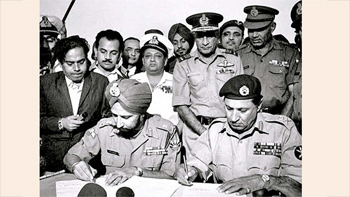The Bangladesh Liberation War, a significant event in South Asian history, took place in 1971. This conflict led to the emergence of Bangladesh as an independent nation, breaking away from what was then known as West Pakistan. The war is remembered for its profound impact on the region's geopolitical landscape, human rights issues, and the enduring spirit of the Bangladeshi people.
The Road to Conflict
The roots of the Bangladesh Liberation War can be traced back to the end of British colonial rule in the Indian subcontinent in 1947. The partition created two separate states: India and Pakistan. Pakistan was divided into two geographically and culturally distinct regions, East Pakistan (present-day Bangladesh) and West Pakistan, separated by about 1,600 kilometers of Indian territory. The political, economic, and linguistic disparities between the two wings fueled resentment in East Pakistan. The situation escalated when the Awami League, under Sheikh Mujibur Rahman's leadership, won a landslide victory in the 1970 general elections but was denied power, leading to widespread protests and civil disobedience movements in East Pakistan.
The Outbreak of War
The official start of the Bangladesh Liberation War is often marked by Operation Searchlight, a military action initiated by the Pakistani Army on March 25, 1971. The operation aimed to suppress the Bengali nationalist movement through force. This brutal crackdown led to the declaration of independence by Sheikh Mujibur Rahman, igniting a full-scale war. The conflict saw significant involvement from local Mukti Bahini (freedom fighters) and widespread support from the general population of East Pakistan.
International Involvement and Response
The war drew attention from the international community. India played a crucial role, providing support to the Mukti Bahini and sheltering millions of refugees who fled the violence. The United Nations and several other countries expressed concern over the humanitarian crisis unfolding in the region. However, geopolitical considerations during the Cold War period influenced the extent and nature of international involvement.
Humanitarian Crisis and Atrocities
One of the most tragic aspects of the Bangladesh Liberation War was the humanitarian crisis. The conflict resulted in widespread atrocities, including mass killings, rapes, and the displacement of millions of people. Estimates of casualties vary, but it is widely believed that hundreds of thousands to several million people lost their lives. The scale and severity of these atrocities brought international condemnation and highlighted the need for global human rights monitoring.
The Role of Media and Public Opinion
Media coverage played a pivotal role in shaping public opinion about the war. International journalists reported on the atrocities, bringing the plight of the Bengali people to the global stage. This coverage was instrumental in garnering international sympathy and support for the cause of Bangladesh's independence.
The End of the War and Birth of Bangladesh
The war reached its conclusion on December 16, 1971, when the Pakistani forces surrendered to the joint forces of the Indian military and the Mukti Bahini, leading to the creation of the independent state of Bangladesh. The day is celebrated in Bangladesh as Victory Day, a national holiday commemorating their hard-fought independence. Additionally, Independence Day is observed on March 26th, marking the day when Sheikh Mujibur Rahman declared Bangladesh's independence in 1971. This day is revered in Bangladesh, symbolizing the nation's struggle and ultimate triumph in achieving self-rule.
Post-War Challenges and Nation-Building
Following independence, Bangladesh faced immense challenges in rebuilding a war-torn nation. The new government had to address issues like refugee resettlement, economic reconstruction, and establishing a functioning political system. Despite these challenges, Bangladesh embarked on a journey of nation-building, focusing on economic development and social progress.
Legacy of the Bangladesh Liberation War
The Bangladesh Liberation War left a lasting legacy on the region. It transformed the geopolitical landscape of South Asia and set a precedent for national self-determination movements. The war's aftermath also highlighted the importance of addressing human rights violations and ensuring justice for victims of wartime atrocities. Bangladesh, over the decades, has strived to overcome the scars of this conflict, fostering a sense of national unity and resilience.
The Bangladesh Liberation War is more than a historical event; it's a testament to the enduring human spirit in the face of adversity. The war's legacy continues to resonate in Bangladesh's cultural and political life, serving as a reminder of the sacrifices made for independence and the ongoing journey towards peace, justice, and prosperity.
